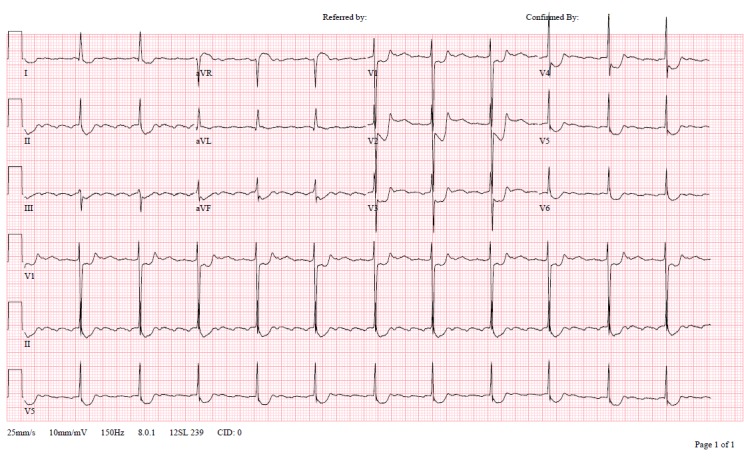| Author | Affiliation |
|---|---|
| Brian J. Wolk, MD | Loma Linda University School of Medicine, Department of Emergency Medicine, Loma Linda, California |
DISCUSSION
Digoxin may cause a multitude of EKG changes including ST depression and numerous cardiac dysrhythmias. 1,2 Differentiation of ST depression in patients with ischemic heart disease and digoxin presence may be feasible in patients undergoing stress testing using heart rate analysis, 2 but the critical nature of a potential acute myocardial infarction patient likely prohibits this in-depth analysis. ST depression may appear indistinguishable from ischemic changes, and the history of digoxin use or digoxin concentration testing should be considered in a patient with nausea and vomiting and signs or symptoms of acute coronary syndrome with marked ST depression.
Footnotes
Section Editor: Sean O. Henderson, MD
Full text available through open access at http://escholarship.org/uc/uciem_westjem
Address for Correspondence: Brian J. Wolk, MD, Loma LInda University School of Medicine, Dept. of Emergency Medicine, 11234 Anderson St., MC-A108, Loma Linda, CA 92354. Email: BWolk@LLU.edu. 12 / 2015; 16:1203 – 1203
Submission history: Revision received September 9, 2015; Accepted September 19, 2015
Conflicts of Interest: By the WestJEM article submission agreement, all authors are required to disclose all affiliations, funding sources and financial or management relationships that could be perceived as potential sources of bias. The authors disclosed none.
REFERENCES
1. Bremner WF, Third JL, Lawrie TD. Massive digoxin ingestion. Report of a case and review of currently available therapies. Br Heart J. 1977;39(6):688-692.
2. Sundqvist K, Jogestrand T, Nowak J. The effect of digoxin on the electrocardiogram of healthy middle-aged and elderly patients at rest and during exercise—a comparison with the ECG reaction induced by myocardial ischemia. J Electrocardiol. 2002;35(3):213-221.



